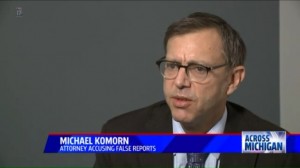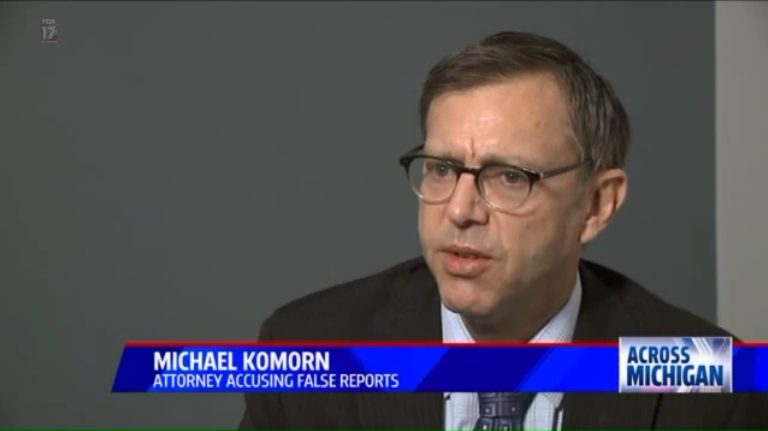
Jan 11, 2016 | Blog, Komorn Law Blog, Michigan Medical Marijuana Criminal Defense, News
by Rick Thompson / January 8, 2016
The watchers watch themselves
Misreporting test results, collusion with prosecutors to turn misdemeanors into felonies.
LANSING – Formal complaints have been filed in federal court against the Michigan State Police Crime Laboratory by criminal defense attorneys who want an independent investigation into the lab’s practices and policies. A series of emails, revealed by FOIA request, illuminate the lab’s “abhorrent and illegal” compromise of scientific method to alter test results from marijuana products in a way that favors prosecutors- changes that were initiated by state drug task forces and the Prosecuting Attorneys Association of Michigan.

Attorney Michael Komorn, who filed Civil Rights and formal complaints to the federal government over the Michigan State Police Crime Lab scandal
“Our formal letter of complaint is intended to launch a serious and objective review of practices of the Crime Lab by the National Institute of Justice,” said Neil Rockind of Southfield, Michigan’s Rockind Law in a press release jointly issued with Michael Komorn of Southfield’s Komorn Law.
The letter was filed with the Director of the National Institute of Justice, Office of Investigative and Forensic Sciences in Washington, D.C. It specifically cites “negligence and incompetence resulting in Crime Lab findings, integrity and reliability that are in serious doubt,” the press release revealed.
Attorney Michael Nichols of the Nichols Law Firm from East Lansing, Michigan, also filed a letter of complaint with the same agency on the same day, December 22.
“Under Michigan law, all marijuana plant-based cannabinoids and the flowers, oils and edibles containing them are controlled as “marihuana” and the possession of these is a Schedule 1 misdemeanor,” Komorn wrote in a special to The Compassion Chronicles. “Only the possession of synthetic, laboratory manufactured cannabinoids is a Schedule 1 felony.”
Synthetic cannabinoids were made illegal in Michigan in 2013 by the state legislature in response to the rise of products like bath salts and Spice/K2, drugs that induced wild and sometimes fatal side effects in users. Those laboratory substances are not included in nor were they ever part of the Michigan Medical Marihuana Act (MMMA). Despite the illegality of the possession of plant-based edibles and oils under an Appellate Court interpretation of the MMMA, those medicines are regularly used by the 180,000 patients and caregivers registered in the medical program.
“What recently uncovered emails reveal is that the AG’s office, the prosecutor’s union, and the drug task forces pressured the lab to report marijuana edibles as a Schedule 1 synthetic felony THC,” Komorn said. “Mr. Ken Stecker of PAAM and the AG’s office prompted the change… pressure also came from the drug task forces so as to better establish probable cause to arrest marijuana patients and forfeit their assets.”
Asset forfeiture by police agencies in Michigan has become such a problem that the state legislature passed a sizable bill package of reforms, which were signed into law by the Governor in 2015. Komorn says 40% of the Crime Lab work is devoted to marijuana testing; marijuana cases turn up forfeiture dollars more frequently than methamphetamine, heroin or other drug cases.
The lab-related emails reveal there was broad opposition among lab scientists and administrators to the new reporting standard, and one employee quit his job at the lab in protest. In one email, Forensic Science Division Controlled Substance Unit Supervisor Bradley Choate said, “For the laboratory to contribute to this possible miscarriage of justice would be a huge black eye for the division and the department.”
Komorn filed a Civil Rights Complaint with the US Department of Justice against two of the Crime Lab’s Directors on December 11 on behalf of his client, Max Lorincz, alleging continued violations of rights in lab actions dating from 2013.
“There is nothing worse in a forensic scientist than ‘confirmation bias,’” said MSP Crime Lab Director Gregoire Michaud, during a presentation to a Criminal Advocacy Program, as quoted by Komorn. Michaud is one of the Crime Lab officials named in the civil rights complaint.
Rockind notes that the collusion between scientists and prosecutors “is antithetical to independent and objective forensic reporting.”
In a recent interview , Komorn said, “The idea that the police and the lab and the prosecutors are all intertwined and they are one side of the team versus the defendant is inherently a conflict.”
Nichols wrote in his letter : “The problem is the interference of the prosecuting attorneys association with the reporting of scientific results. It reflects a culture that the lab and its analysts are not scientists reporting forensic analyses dispassionately in court through testimony.”
Both the Komorn/Rockind and Nichols complaints cite other issues with the Crime Lab, including under-reporting of the uncertainty factor of blood alcohol testing.
Federal action became necessary when defense attorneys discovered that the entity registered with the National Institute of Justice to oversee allegations of negligence or misconduct at the State Police Crime Lab is the State Police themselves. As documented by Fox 17 in Lansing, the Internal Investigations unit at the MSP saw no problem with the activities at their sister agency.
Specifically, Fox 17 quotes the MSP representative as saying, “ An internal policy change does not constitute misconduct or negligence. Therefore, no investigation is underway … the MSP does not consider your reports on a debate among colleagues prior to an internal policy decision to rise to the level of an allegation of misconduct.”
Despite their denials to media about their concerns over the crime Lab story, internal emails from the MSP itself reveal a great deal of discussion on the issue and media coverage of it. Attorney Nichols used FOIA to reveal a 159-page email chain regarding the prosecutors/lab scandal and the fallout from it- initiated by the same MSP Public Relations representative that claimed they had no interest in the issue.
Rockind and Komorn are not filing a federal lawsuit at this time, per the press release. The National Institute of Justice has not yet responded to the formal complaint.
The Michigan lesson is one activists and attorneys from other states should note. Monitoring the procedures and relationships formed at and by each state’s forensic services is crucial to ensuring the integrity of the judicial process.
Komorn has been documenting the evolution of the case in a blog on his law firm’s website. A summary of these articles is included below.
komornlaw.com/medical-marijuana-lawyers-want-state-crime-lab-moved-out-of-michigan-state-police/
komornlaw.com/defense-attorneys-seek-fed-inquiry-of-msp-crime-labs/
komornlaw.com/federal-complaints-allege-marijuana-misreporting-by-state-police-crime-lab/
komornlaw.com/michigan-prosecutors-pressured-lab-on-medical-marijuana-results/
komornlaw.com/msp-defends-marijuana-crime-lab-reporting-after-fox-17-investigation/
komornlaw.com/attorney-alleges-authorities-bend-the-science-to-elevate-marijuana-cases/
komornlaw.com/drug-felonies-without-credible-proof-allegations-of-politicking-in-state-police-crime-labs/
komornlaw.com/crime_labs_falsified_marijuana_report/
komornlaw.com/emails-spell-out-alleged-scandal-in-state-crime-lab-testing-falsely-reporting-marijuana/
komornlaw.com/a-non-stop-political-game-former-msp-forensic-science-director-on-false-marijuana-reporting/
komornlaw.com/michigans-medical-marijuana-law-circumvented-by-crime-labs-thc-reports-attorney-charges/
komornlaw.com/medical-marijuana-patient-alleges-prosecutors-swayed-crime-lab-drug-tests/
komornlaw.com/allegations-msp-falsely-reporting-marijuana-targeting-card-carrying-patients/
 Written by Rick Thompson
Written by Rick Thompson
Rick Thompson was the Editor in Chief for the entire 2-year run of the Michigan Medical Marijuana Magazine, was the spokesman for the Michigan Association of Compassion Centers and is the current Editor and Lead Blogger for The Compassion Chronicles. Rick has addressed committees in both the House and Senate.

Dec 24, 2015 | Blog, Komorn Law Blog, Medical Marijuana, Medical Marijuana Attorney Michael Komorn, News
GRAND RAPIDS, Mich. — At least three attorneys filed federal complaints Tuesday against the Michigan State Police Forensic Science Division for allegations of serious negligence or misconduct, and to contest grant money the crime labs received this year.
However, officials with both the MSP and the Michigan Attorney General’s Office told FOX 17 their agencies are not conducting investigations into these allegations.
Each complaint filed Tuesday was issued to the National Institute of Justice, Office of Investigative and Forensic Sciences’ Director. Attorney Mike Nichols and attorneys Michael Komorn and Neil Rockind together wrote to inform the NIJ of the accusations that the MSP crime labs have been misreporting marijuana test results and elevating misdemeanors to a felony for the possession or manufacture of synthetic marijuana.
In late October, FOX 17 broke these allegations when Komorn uncovered internal MSP e-mails where some crime lab analysts and directors themselves protested a new THC reporting protocol change. Namely, MSP-FSD Controlled Substance Unit Supervisor Bradley Choate wrote in part, “For the laboratory to contribute to this possible miscarriage of justice would be a huge black eye for the division and the department.”
Komorn accuses the Prosecuting Attorneys Association of working inappropriately with and influencing policy of the MSP crime labs to misreport marijuana extracts, such as oils and edibles, as synthetic THC, a felony. The change seen on lab reports stems from a recent MSP-FSD policy change in the way THC is reported. Analysts are now required to write phrases such as “origin unknown” on crime lab reports when THC is tested when they believe they cannot determine the substance’s origin. Extracts have not been reported in this way for decades before, as one analyst testified back in April.
MSP is a 2015 recipient of the Paul Coverdell Forensic Science Improvement Grants Program.
This year the National Institute of Justice data shows it awarded MSP-FSD $236,488 in funding. One of the stipulations as a grant recipient is to name an independent external government entity to conduct investigations when allegations of serious negligence or misconduct occur. In addition to investigating these allegations, grant recipients are also required to report the allegations to NIJ.
However, records show that MSP-FSD has named its independent external investigating entity as MSP-Internal Affairs. In the filed federal complaints, Nichols, Komorn and Rockind state their concerns that MSP-Internal Affairs is not independent or external from MSP, and also asked for a thorough investigation to be done into these allegations.
“It’s an avenue to bring to light some very real and important concerns,” said Nichols.
“The Michigan State Police Internal Affairs unit is the entity that is set up through the grant that they applied for to investigate complaints,” he said. “Well, that’s the fox guarding the hen house obviously, but it’s the mechanism that’s in place, so I’ve asked for them to utilize it.”
The complaints filed Tuesday to NIJ follow Komorn Law’s complaints regarding MSP crime lab marijuana testing allegations filed Dec. 11 with the U.S. Department of Justice Civil Rights Division, the FBI and the Civil Rights Division for the Eastern District of Michigan, which has referred it to the U.S. Attorney’s Office for the Western District of Michigan in Grand Rapids.
Despite the allegations and filed complaints, MSP Public Affairs Manager Shanon Banner told FOX 17 on Tuesday that the MSP-IA is not investigating. In e-mails Banner said:
“I have confirmed that for at least the last three years, our Coverdell grant application, which was approved by the National Institute of Justice, has included the MSP Professional Standards Section (aka Internal Affairs) as the “government entity” responsible for investigating any allegations of serious negligence or misconduct. The Professional Standards Section maintains responsibility for investigating all allegations of misconduct involving MSP employees. These investigators are housed within the Office of the Director and are not members of the Forensic Science Division.
An internal policy change does not constitute misconduct or negligence. Therefore, no investigation is underway.”
When FOX 17 pressed Banner further she wrote:
“As stated in the earlier response, our designation of the MSP Professional Standards Section as the entity to conduct investigations has been approved by the NIJ for at least three grant cycles. Our review of the guidance provided by the NIJ for this grant did not uncover any federal guidelines as to what constitutes an “independent external entity.” Since the Professional Standards Section is independent, and external to the Forensic Science Division, it appears sufficient. However, your question may best be posed to the NIJ.
As to your second follow-up, the MSP does not consider your reports on a debate among colleagues prior to an internal policy decision to rise to the level of an allegation of misconduct.”
FOX 17 has reached out to the NIJ, and has yet to hear back.
Despite Banner stating the MSP does not consider these concerns allegations of misconduct, a recent chain of MSP emails show the agency appears to be keeping a close eye on FOX 17 reports. In a recent 159-page email chain between MSP personnel and supervisors that Nichols obtained through the Freedom of Information Act, in an email dated Nov. 12 Banner emailed MSP supervisors and agency leaders a link to FOX 17’s Nov. 10 report and stated:
“FYI – Here is Dana Chicklas’ most recent story from Tuesday night on medical marijuana.”
Nichols, like Komorn, Rockind, and many others, continue to push for reform in MSP crime lab procedures, beginning with a timely investigation into these allegations.
“There has been some very gray discussion about doing something to fix what happened in Ottawa County, but that’s not good enough,” said Nichols. “We need to make a change, it’s got to happen.”
“When the forensic analyst comes to court, regardless of who calls them, take off the Michigan State Police pin, put it on the stand, take off the Michigan State Police hat, and tell it like it is, and work with the accused the same way, with the same vigor, to seek justice that you would with the prosecutor.”
FOX 17 has reached out to Governor Rick Snyder’s office for comment regarding MSP crime lab allegations and filed complaints. As of Tuesday evening we have no response.
As for Ottawa County defendant Max Lorincz, his criminal case is pending.
Read Nichols’ full NIJ complaint here.
Read Rockind and Komorn’s NIJ complaint here.
Read Komorn Law’s filed DOJ complaint here.
Read Max Lorincz MSP LAB REPORT Exhibits
BY DANA CHICKLAS – Read the Original Post
Komorn Law Social Media
Recent Posts
Tag Cloud
2021
BMMR
cannabis
CBD
corruption. prosecutors
dispensary
Driving
DUI
forfeiture
gun rights
hemp
komornlaw
lara
law enforcement abuse
laws
Legalization
marijuana
Medical Marijuana
Michigan
michigan laws
michigan news
MMFLA
MRA
news
police
politics
science
usa news
us supreme court
Your Rights
DISCLAIMER
This post may contain re-posted content, opinions, comments, ads, third party posts, outdated information, posts from disgruntled persons, posts from those with agendas and general internet BS. Therefore…Before you believe anything on the internet regarding anything – do your research on Official Government and State Sites, Call the Michigan State Police, Check the State Attorney General Website and Consult an Attorney – Use Your Brain.

Dec 15, 2015 | Blog, Komorn Law Blog, Marijuana Criminal Defense Attorney Michael Komorn, Medical Marijuana, News
Detroit police arrested two people and confiscated two firearms and drugs during a raid on a marijuana dispensary Tuesday afternoon.
Police seized 4,100 grams of marijuana (about 9 pounds), and removed 12 edible marijuana foods from the shelves at Detroit Medz, said Sgt. Cassandra Lewis of Detroit police Media Relations.
“Our Major Violators Unit executed a search warrant at the location at 4:30 p.m.,” Lewis said.
According to state law, only Michiganders who possess state registry cards can legally use medical marijuana, but at the shop “they were just selling to anybody who walked in,” she said.
Related: Police raids of pot dispensaries lead to arrests
Detroit does not have an ordinance regulating dispensaries. Detroit police favor having dispensaries be regulated, “so that it’s safe not just for the customers but also for the community,” Lewis added.
In addition, police say flyers advertising Detroit Medz, located at Hubbell and Puritan, were reportedly being distributed near John R. King Academic and Performing Arts Academy when a commencement exercise was taking place.
Some law enforcement agencies claim all dispensaries are illegal until the state Legislature passes a law allowing them. State Attorney General Bill Schuette agrees with that assessment.
The city of Detroit is overdue for regulating its fast-spreading dispensaries, said Winfred Blackmon, a community leader in northwest Detroit who is outspoken about medical-marijuana commerce.
Leonard Pitts Jr.: Enough with this silly war on marijuana
“I’m not against this for people who are sick, but what we want is regulation,” said Blackmon, 67, chairman of the Metropolitan Detroit Community Action Coalition – a group of community leaders from across the city. He also heads a major homeowners group in northwest Detroit called the Schaefer-7/8-Lodge Association.
Blackmon has been complaining to the city about dispensaries for months and has been in regular contact with Councilman James Tate as well as with state legislators about the need to regulate them, he said.
A local ordinance, spelling out what Detroit authorities expect of the city’s dispensaries, would protect legitimate operators and weed out any that are undesirable, added Southfield attorney Michael Komorn, president of the Michigan Medical Marijuana Association.
But without such regulation in place, Tuesday’s raid was ill-advised because Detroit police should focus on violent crime – not dispensaries, Komorn said.
“I can’t speak to this specific location, but there’s a lot of dispensaries operating in Detroit and it’s unfortunate that Detroit’s leaders and citizens seem to be at odds about whether they should be there. Some people still see medical marijuana as just dope,” he said.
“These places are not causing lawlessness and they’re not hurting property values in the city,” Komorn said.
If you or someone you know is facing charges as a result of Medical Marijuana recommended to you as a medical marijuana patient under the Michigan Medical Marijuana Act, contact Komorn Law and ensure your rights are protected. Michael Komorn is recognized as a leading expert on the Michigan Medical Marihuana Act. He is the President of the Michigan Medical Marijuana Association (MMMA), a nonprofit patient advocacy group which advocates for the rights of medical marijuana patients and their caregivers.
Contact us for a free no-obligation case evaluation at 800-656-3557.
www.komornlaw.com

Dec 4, 2015 | Blog, Komorn Law Blog, Legalization, News
According to the latest Gallup poll, 58% of Americans think marijuana should be legal. Surveys conducted in March and October found that most Ohioans agree. So why did Ohio voters overwhelmingly reject Issue 3, which would have legalized marijuana for medical and recreational use, in yesterday’s election? Two reasons spring to mind.
Ohio voters do not like crony capitalism.
The campaign against Issue 3, dubbed Ohioans Against Marijuana Monopolies, focused on the initiative’s most controversial feature: a cannabis cultivation cartel that would have limited commercial production to 10 sites controlled by the initiative’s financial backers. As I explained here last week, that aspect of the initiative caused consternation even among people who otherwise support marijuana legalization. Two leading drug policy reform groups, the Drug Policy Alliance (DPA) and the Marijuana Policy Project (MPP), were conspicuously neutral on Issue 3. The National Organization for the Reform of Marijuana Laws (NORML) issued a decidedly ambivalent endorsement under the headline “Investor-Driven Legalization: A Bitter Pill to Swallow.” The Republican Liberty Caucus of Ohio and the Libertarian Party of Ohio were opposed.
If your marijuana legalization initiative turns libertarians against marijuana legalization, you probably have done something wrong. As DPA Executive Director Ethan Nadelmann noted last week, “a constitutionally mandated oligopoly for an agricultural product…seems un-American” and “sticks in the craws of both liberals and conservatives.” The ballot description highlighted this aspect of Issue 3, saying the initiative “grants a monopoly for the commercial production and sale of marijuana for recreational and medicinal purposes” and would “endow exclusive rights for commercial marijuana growth, cultivation, and extraction to self-designated landowners who own ten predetermined parcels of land.”
Worse, Issue 3 appeared on the ballot right after Issue 2, a measure that was designed to block marijuana legalization by prohibiting the use of initiatives to insert economic privileges into the state constitution. Issue 2 was described as an “anti-monopoly amendment” that “protects the initiative process from being used for personal economic benefit.” It received support from 52% of voters. A Kent State University survey commissioned by WKYC, the NBC station in Cleveland, found that Issue 2 was popular even among supporters of legalization.
The Atlantic’s David Graham rightly highlights voters’ “concerns about monopoly control” but wrongly conflates those concerns with opposition to “Big Marijuana,” the favorite bogeyman of the anti-pot group Project SAM. While anti-corporate attitudes may help explain some progressives’ opposition to Issue 3, conservatives and libertarians who oppose prohibition but nevertheless had qualms about the initiative were not troubled by the prospect that businesses would make a lot of money by producing and selling marijuana products. They were troubled by the prospect that the market would be rigged. Opposition to Issue 3’s crony capitalism should not be confused with opposition to cannabis capitalism.
Ohio State law professor Douglas Berman sees a silver lining for antiprohibitionists in the successful campaign against Issue 3. “That reinforces my sense that actually it’s very hard to defend prohibition on the merits, but it’s much easier to attack any particular plan to get away from prohibition,” Berman told Graham. “To me, the reform community has to be ecstatic to see that even in a purple state like Ohio, the advocacy against reform wasn’t, ‘Marijuana is this evil weed.’ It was, ‘Don’t trust those monopolists to legalize weed.’”
Voters who participate in off-year elections are not very keen on legalization.
The Kent State survey, which was conducted in the first week of October with a sample of 500 registered voters, put support for Issue 3 at 56%. But the pollsters warned that the result could be misleading, since people who cast ballots in years when voters are not electing a president “tend to be older and more Republican than the eligible electorate.” That’s relevant to the fate of Issue 3 because Republicans and older voters tend to oppose legalization. In the Kent State survey, only 45% of Republicans, 46% of 61-to-70-year-olds, and 29% of respondents older than 70 favored Issue 3.
A Bowling Green State University (BGSU) poll conducted in mid-October reinforces the point that off-year elections are not favorable to marijuana legalization. Unlike the Kent State survey, the BGSU poll focused on “likely” voters, and it found less support for Issue 3: 44%, with 43% opposed and 13% undecided. In the end, Issue 3 got just 36% of the vote.
Disappointments like that one convinced Rob Kampia, MPP’s executive director, that legalizers should focus their efforts on presidential election years. His group is backing legalization measures in five states next year: Arizona, California, Maine, Massachusetts, and Nevada. “When voters in Nevada or Massachusetts get to the ballot box one year from now, they are not going to be thinking about what happened in Ohio a year earlier,” says Mason Tvert, MPP’s communications director. “They are going to be thinking about the problems marijuana prohibition has caused their states for so many years and the benefits of replacing it with a more sensible system. These initiatives will also benefit from heightened voter turnout during a presidential election year. The more voters that turn out, the more support we tend to see for marijuana policy reform.”
While that’s exactly what you would expect a legalization activist to say, that does not mean it isn’t true. Voters have endorsed legalization in four states and the District of Columbia so far, and given trends in public opinion—in particular, the association between prohibitionism and old age—there is no reason to think that will be the end of it.
Although his side won yesterday, Project SAM’s Kevin Sabet is the one who seems to be whistling past the graveyard. “We’ve proven that legalization, even by popular initiative, can be stopped,” he says, “and we intend to build on this momentum.” The fact that anti-pot activists are crowing about winning one out of six battles over legalization—a situation that would have seemed fanciful just a few years ago—tells you all you need to know about the future of marijuana prohibition in America.
Nov 4, 2015 Jacob Sullum – Contributor
See Original Article Here

Nov 24, 2015 | Blog, Komorn Law Blog, Medical Marijuana Attorney Michael Komorn, Michigan Medical Marijuana Act, Michigan Medical Marijuana Criminal Defense, News
On Tuesday, November 10th, the Warren City Council held a public hearing regarding a proposed medical marijuana ordinance being championed by Mayor Jim Fouts. Fouts claims the ordinance is in response to concerns about growing medical marijuana in residential areas, including a house explosion on Harold street on September 28th that was reportedly due to butane hash oil extraction being performed inside of the home.
The Warren ordinance seeks to:
• Prohibit the consumption of marihuana in any area of any property open to the public or in a non-public area of a property where the owner has prohibited it
• Prohibit the transfer of marihuana at a caregiver’s residential dwelling
• Prohibit the odor of marihuana from being emitted beyond the interior of a structure
• Demands ventilation, filtration, and exhaust equipment to control the odor of marihuana
• Prohibits the growing, manufacturing, or processing of marihuana by a caregiver outside of an M-1 or M-2 industrial district. A qualifying patient may grow marihuana in their home, but only after registering and submitting a plan with the city’s building department and allowing inspections by both the building and fire departments
• Demands that, if a fire occurs as a result of the growth, cultivation, or processing of medical marihuana, that the qualifying patient be responsible for all emergency response costs or injuries which result
• Demands that when medical marihuana is transported inside of a motor vehicle, that it only be done in a sealed and locked container which is not readily accessible from the interior of the vehicle.
Violation of the proposed ordinance would be misdemeanors.
During public testimony, Southfield attorney Michael Komorn said, “There is an old saying for lawyers: When you don’t have the facts, argue the law, and when you don’t have the law, argue the facts.” Komorn went on to say, “After reading these proposed amendments, I can tell they have neither.”
Attorney after attorney echoed Komorn’s sentiment, stating the proposed ordinance was unconstitutional and in direct conflict with the Michigan Medical Marihuana Act as well the Supreme Court opinion issued in Ter Beek v City of Wyoming.
In addition, several residents also testified about how they would be negatively affected should the ordinance pass.
After enduring 2 hours of public testimony, of which none was in support of the ordinance, Council President Cecil St Pierre stated that the Council had “received an education” regarding the proposed ordinance and a motion was passed to table the first reading of the ordinance for further discussion by the committee of the whol
e. Several Council members, including Council Secretary Scott Stevens, pressed to have a motion to deny heard – a vote, however, never materialized. It is expected that a revised ordinance will appear on the Council’s agenda sometime in the next several months.

Nov 1, 2015 | Blog, Criminal Defense Attorney Michael Komorn, Komorn Law Blog, News
DEWITT, Mich. – A former director of Michigan State Police Forensic Science addressed the serious allegations FOX 17 uncovered, which accuse the Attorney General’s office and state prosecutors of influencing state police crime labs to falsely report marijuana; essentially turning misdemeanors into felonies.
Former MSP Forensic Science Director John Collins told FOX 17 that he resigned from this role in 2012 due, in part, to these crime lab reporting issues: politics working to trump science.
“In my experience, it was just a non-stop political game that really got frustrating, and it wore down the morale of our staff, and it quite honestly, it wore me down.”
Collins served as director 2010 through 2012, when he said he surprised the agency by resigning; even after the 2012 success of helping earn MSP Forensic Science international accreditation with the American Society of Crime Laboratory Directors/Laboratory Accreditation Board.
“It was really a big deal for me to let people understand that our laboratories were not in the prosecution business, they’re not in the conviction business, they’re in the science business,” said Collins.
“And if we don’t position ourselves as being in the science business, then we really start to go down a path that’s going to lead us to a lot of trouble. And that was very tough, because that was a major cultural, a different kind of a cultural message than had really been communicated before.”
Collins said forensic science is his passion. He is now president of The Forensic Foundations Group, a consultant, and publishes articles quarterly in Crime Lab Report: Media and public policy analysis for the forensic science community. Last March, Collins also published an article in Forensic Science Policy & Management: An International Journal, and depicted how a utopian forensic crime lab would operate, which he said is quite different than state labs.
“There is a lot of politics that is involved in these cases,” said Collins.
“So even if the state police was to really kind of buck the trend, and say, ‘look, these laboratories are scientific organizations, they’re not law firms, okay, and we’re not going to let them become law firms,’ even if they kind of buck that trend, you can bet that there’s going to be some angry prosecutors that are going to call the Governor’s office and complain. It’s like kicking over a bee’s nest.”
FOX 17 reviewed documents with Collins, including the months of emails between MSP Forensic Science directors, scientists, and Attorney General office officials, as well as a recent crime lab report; documents the defense for Max Lorincz, Komorn Law PLLC, obtained through the Freedom of Information Act.
Lorincz, an Ottawa County father, is the defendant whose case FOX 17 has covered since February. Lorincz, a card-carrying patient, is charged with a felony for having a “smear” amount medical marijuana, in the form of Butane Hash Oil.
“An accreditation assessor would have a problem would probably look at this and have a problem with why would you even say anything like this?” Collins said, looking at the crime report’s phrase, “origin unknown.”
After review of Lorincz’s crime lab report, Collins said he is not surprised to see the ambiguous results.
“Even though I don’t know the nature of what occurred within the state police, any time that scientists, or administrators of scientific operations, if they would intentionally try to create ambiguity to create a political advantage is beyond unacceptable,” said Collins.
Collins explained it is appropriate for prosecutors to explain state statutes to crime labs, or what elements constitute a crime. However, he said for any prosecutors or other officials to tamper with science is illegal.
“One thing that we do not do, or should not do, is try to widen the gray area so that we create more ambiguity so that more possibilities are on the table,” said Collins. “That’s not science, that politics.
FOX 17 has received statements from Michigan State Police Public Affairs as well as the Prosecuting Attorneys Association of Michigan regarding these accusations.
Yet their responses appear to be blanket statements. Both agencies defer to the other: MSP public affairs officials wrote that it is up to the prosecutors to charge crimes, and then PAAM president wrote it is up to the crime labs to report science.
FOX 17 has reached out to the Attorney General’s office for comment, and has yet to hear back.
As for the defendant in this case, Max Lorincz told FOX 17 Friday that he wants the prosecutor held accountable. Lorincz also questioned the amount of money that has been spent in court over this case, and asked for justification of his felony charge.
It has been more than 13 months since his 6-year-old son was taken from his home, in part due to this felony charge. Lorincz and his family have started a GoFundMe page to help raise money to continue fighting his case.
Watch The Fox 17 Report
www.forensic-news.com/a-non-stop-political-game-former-msp-forensic-science-director-on-false-marijuana-reporting/


 Written by Rick Thompson
Written by Rick Thompson














